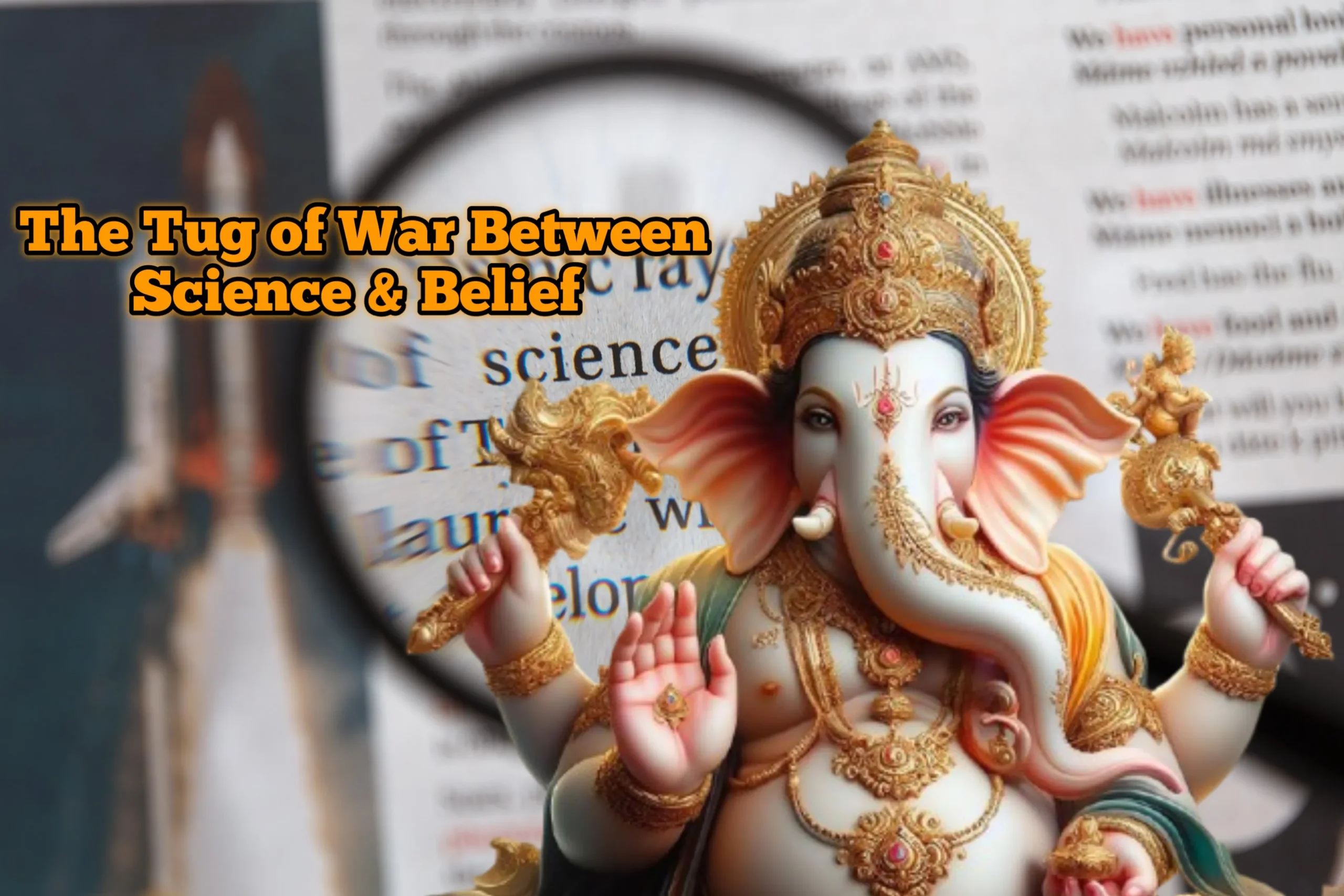Science is one form of scientific knowledge. Based on scientific facts, we then understand them through scientific understanding. And that knowledge is not just science. For thousands of years, our knowledge was not based on scientific knowledge. Yes, it was knowledge, but not scientific knowledge. For example, imagine you are living around the year 500 AD. If you were living in the year 500 AD and you wanted to seek knowledge (learn), the sources you would obtain would be sources of non-scientific knowledge. Not scientific at all. In that year, and even now, knowledge is actually dominated by authority-based truth knowledge.
Authority-based truth knowledge is knowledge or truth based on who is speaking, on people who have authority. So just imagine 3000 years ago, what were the sources of knowledge? Yes, tribal chiefs, astrologers, shamans, religious experts, and other authority figures. They were the people who were most averse to saying “I don’t know.” You could ask them anything, and they would definitely know the answer. Even though they often answered nonsense. Try asking a religious leader anything, they will definitely have the answer, even if sometimes the answer is nonsense. For example, “Reverend, my child has a fever. What is the cause?” Of course, they often answer, “Oh, it’s because you lack faith.” Or other nonsensical answers that have no scientific correlation with a child’s fever.
However, these sources of knowledge have been authority-based truths for thousands of years. This is indeed knowledge, but it is not scientific. It is different from science. Science is based on facts. The basis of science is that if we don’t know, we say we don’t know. So a scientist or someone involved in scientific knowledge is not afraid to say they don’t know. If they don’t know, they say they don’t know. They will not make up answers to appear all-knowing. For example, if a scientist is asked, “What happened before the Big Bang?” The scientist will surely answer, “I don’t know.” This is because there are no scientific findings on what happened before the Big Bang. That’s okay. It is precisely this ignorance that drives scientists forward. Because we don’t know, we seek to find out. Scientific thinking is that if we don’t know, we don’t know; we don’t make up answers.

So science is based on scientific facts and explains things scientifically, not based on coincidences. For example, if we obtain facts and then match them with our beliefs, that is a coincidence. And this is what most people do. As soon as there is one thing that matches their beliefs, they discuss it exhaustively. “My beliefs have said this for thousands of years.” Even though they don’t see that thousands of their beliefs are all nonsense, they defend them fiercely.
But that’s okay. It’s how our brains make us feel comfortable. So even unscientific knowledge, even if it’s nonsense, makes us feel comfortable. And our brains are not designed to distinguish between right and wrong. No! Our brains are not designed to distinguish between the two. The brains of all animals, including humans, are designed to survive as long as possible. For example, the brain of a camel—would a camel’s brain be used to think about mathematics? No, right? A camel’s brain is used so that it can survive as long as possible. That’s how a camel’s brain works. In humans, after the brain developed, humans gained consciousness, developed language, and their knowledge became diverse. But still, the way the human brain works is to ensure that humans can survive for as long as possible. Well, one of the things that allows us to survive and motivates us to continue living is that we are calm, comfortable, and happy. That is our motivation to continue living. If you are anxious, it can lead to suicidal thoughts.
Science has only existed for a short time. In the 350,000 years of human history on Earth, science is estimated to have only existed and developed since 2500-4000 years ago. That is what distinguishes science from non-science. So why are there still so many people with a non-scientific mindset, even though knowledge has developed so much today? In this case, what is wrong? Or are we, who think scientifically, the ones who are wrong?
Nothing is wrong. There is nothing wrong with people who think scientifically or anti-scientifically. They are just different. But people who are anti-science should not claim to think scientifically. Yes, pseudo-science. Pseudo-science also makes people feel comfortable. So they do not feel anxious because their beliefs are wrong. But they try to find justification, not truth. Yes, they seek justification for what they believe in. By manipulating scientific facts with linguistic acrobatics. Their beliefs, which are not based on facts, seem to become true. That is not wrong either. Indeed, people think differently. It’s just that such things are not scientific.
Why are there still so many people like that today? Because our lives have only recently come to rely on it. Even biology only returned to the embrace of science when Charles Darwin was born. Meanwhile, physics and chemistry had long since ceased to be associated with mysticism, since the 11th-12th centuries. Unlike biology, until Charles Darwin was born, there were still unscientific aspects in biology. In the 18th century, biologists still believed in the existence of elan vital, or life force. This philosophical concept was created by French philosopher Henri Bergson. There is another entity in our bodies besides our physical bodies. Scientifically speaking, however, only our physical bodies exist.

There is no such thing as a soul. Scientifically speaking, I now ask you, of the 8.23 billion people currently living on this planet, who is willing to accept the fact that there is no soul inside their body? If you can accept it, that is scientific. If not, that is not scientific. But it’s okay if you don’t accept it.
For thousands of years, humans did not know that the Earth was round, and that’s okay. For thousands of years, we did not know that we were animals, and that’s okay too.
The problem is the gap. The gap between people who understand a field of science and those who don’t is getting wider. For example, in Aristotle’s time, the gap between people who understood physics and those who didn’t was narrow. But today, the gap between people who don’t understand physics and physics experts is very wide. It’s just that today, many people pretend to know everything. They talk about quantum as if they understand what quantum is. There is a term called “quantum sincerity.” How strange! How can they talk about quantum sincerity when they don’t even know what quantum physics is like?
But it’s not a problem that people who aren’t scientific are wrong, no. They just view the world differently. Scientific people also view the world in a scientific way. Of course, anti-science people owe a lot to scientific people. Yes, that’s true. But anti-science people will never be willing to become scientific. Until now, genetics, microbiology, and even medical science adhere to the theory of evolution. All branches of science do, without exception. But by the way, doctors are not scientists. Doctors are technicians. Just look at general practitioners working in the ICU of a hospital. When a patient arrives, the general practitioner will definitely follow standard operating procedures. Even though standard operating procedures are created by scientist doctors who follow the latest science, the people implementing them in the field are not scientists.
For example, according to standard operating procedures, people with high body temperatures are given paracetamol. If you ask a general practitioner how paracetamol works, they won’t know. They have indeed taken pharmacology classes and been taught how paracetamol works. Paracetamol works by blocking arachidonic acid so that it does not become its four derivatives, thereby preventing inflammation in the body. But when they become general practitioners, do they still remember that? Do they prescribe paracetamol? Because that’s what they’re used to doing. So, it’s not surprising that there are doctors whose behavior is not scientific. There are many. Because medicine has been based on belief for a very long time. Seriously? Medical treatment in the 17th and 18th centuries was based on belief, not scientific facts. That is a historical fact of medicine. So if there are doctors today who are not scientific, that is normal.
Okay, let’s return to the discussion of scientists and anti-scientists. Why do anti-scientists tend to attack scientists more often? It’s because scientists take away what is most precious to them. Why is the theory of evolution so widely opposed? It’s not quantum mechanics or anything else. The theory of evolution is actually quite simple. There is nothing in the theory of evolution that threatens religious doctrines. Nothing. What threatens religious doctrines is quantum mechanics, general and special relativity. How can that be?
According to the theories of general and special relativity, time is relative. There is no absolute time. Meanwhile, the rituals of all religions are based on time. Let’s imagine that. Does that mean those rituals are unnecessary? Time is relative, and its duration is also relative. Especially quantum mechanics theory. In quantum mechanics theory, there is, for example, the multi-universe. That means there are thousands of Octavianto in this multi-universe. There is Octavianto here, there is Octavianto there, there is Octavianto everywhere. Yes, they are the same Octavianto but with different personalities. So, in the context of Octavianto’s religious practices, which Octavianto is recorded and counted? Quantum mechanics theory is more likely to threaten religious doctrines than the theory of evolution. Isn’t that so?
What makes the theory of evolution considered a threat? The theory of evolution explains that those who are fit for nature, through natural selection, are the ones who survive. That’s all there is to the theory. But the theory of evolution takes away what is most precious to them. What is that? Life (soul)! Isn’t life considered the most precious thing that humans have? If we really study the theory of evolution, modern biology, life does not exist. Just imagine, humanity’s most precious possession is being taken away!

Just imagine if humans had no soul, it would be the end! But if the soul still exists, even if life on Earth is miserable, perhaps after death, life will be pleasant. Isn’t that what humans hope for? Just imagine if humans’ souls were taken away, they would be angry. And that is what makes us believe that if we speak against someone’s beliefs, they will be angry. Because the theory of evolution takes away what is most precious to humans.
About beliefs. Even if a belief is wrong, when human beliefs are confronted with facts, the human brain tends to ignore those facts. It doesn’t modify or revise the belief, no! It rejects it! The facts are ignored. An easy example is how humans can think scientifically if, from childhood, they are taught that nothing is impossible. Imagine that.
There are many things that are impossible in this world. If, from childhood, we are taught that nothing is impossible in this world, it makes us happy. The statement “nothing is impossible” makes us happy. Once this statement is taken away, people lose hope. But there are many things that are impossible in this world. Do you want proof? Try throwing a die. Just throw it. Is it possible that it will show the number 8? No, it’s impossible, because the numbers on a die are only 1 to 6. You come home from work, and when you arrive home, your wife has become a man? Is that possible? Tomorrow you wake up, and Indonesia has turned into Finland? No, that’s impossible! Even if you pray 90 times a day, that’s not possible. There are many things that are impossible. For example, your Toyota car that you parked in the garage last night, when you approach it in the morning, it’s impossible for it to suddenly become a BMW.
However, even though the statement “nothing is impossible” is incorrect, many people hold on to it. Why? It gives hope. It is pleasant. It is reassuring. That is why the scientific mindset is difficult to develop or spread, because for many people who hold on to their beliefs, the scientific mindset makes them uncomfortable. However, with the advancement of knowledge and civilization, there are civilizations that no longer hold onto beliefs. Instead, they hold onto consequences.
And that is what makes them happier. For example, Finland, Denmark, and Iceland no longer hold on to beliefs. Even beliefs or symbols of belief, symbols of religion, are prohibited from being expressed in those countries. They hold on to consequences. If you walk north, you will arrive in the north. It is impossible for you to walk north while saying, “Anything is possible, we are walking north, and if it is mystically intended, we will arrive in the east.” That is impossible. A happy human brain is not a brain trained by science. Period. No, the human brain is trained to be happy. Now that we understand how the human brain works, if someone isn’t scientific, it doesn’t mean they aren’t using their brain. No. And scientific people are the same. Scientific people and non-scientific people both use their brains, only in different ways. So if someone is stupid, it doesn’t mean they’re not using their brain, they’re just using it in a different way. So if someone is stupid, they should be praised, “Oh, your stupid brain is active, isn’t it?” Don’t insult them! Because they don’t have no brain, just a very active stupid part of their brain.
Is this the same as the number of people who are easily fooled by hoaxes? Yes. Why do hoaxes so easily hijack our rationality? Because hoaxes have helped humans for hundreds of thousands of years. Humans developed a conspiracy or hoax brain to save themselves. For example, imagine our human ancestors living on the grasslands of the African savanna around 150-200 thousand years ago. What was needed at that time was speed—how humans could avoid death or threats—which was more important than the truth. To be more specific, if someone (our ancestors) saw bushes swaying, if their brains were full of conspiracy theories, they would think, “Uh, there’s a predator. There’s a tiger. Let’s run.“ But it wasn’t necessarily a tiger behind the bushes. People like this were more likely to survive than those who thought, ”Ah, it’s not necessarily a tiger. Maybe it’s rabbits mating. Let’s find out.” But what if it really was a tiger? Then they would die.
So people who develop conspiracy theories and hoaxes find it easier to survive than people who seek the truth. Conspiracy theories and hoaxes in the human brain have saved humans from extinction. And that has been true for thousands of years. So the scientific knowledge that has only existed and developed in the last 2000 years, or even the last 1000 years, is far incomparable when compared to the 350,000 years of human existence. That means only 1 in 300 have developed scientifically. So if there are scientific people, they are actually quite rare. They are extremists. There are very few of them, and unfortunately, they are often hated. In any era, scientists are often met with hostility. From Avicenna, Nicolaus Copernicus, Galileo Galilei, and many others. Science is the enemy of those who are settled. If your beliefs are completely overturned, you will be angry. Because they are precious.
But the fact is, in this world, there are no purely scientific people or purely anti-science people. Most people are somewhere in the middle. There are fewer people who lean toward one extreme or the other, whether they are scientific extremists or belief extremists. So, don’t be surprised if you see scientists still mixing in superstition, mysticism, or belief. It’s okay, just let it be. Maybe they are looking for peace or pleasure.
Science is fundamentally skeptical. Everything is considered non-existent until proven to exist. Belief is different. Everything must exist until proven not to exist. So if someone believes something exists, they require others to prove that it does not exist. Isn’t that strange? They are the ones who believe, yet others must prove that their belief is wrong. But this is what has kept humans calm for hundreds of thousands of years. Whether you live once or thousands of times, living a calm and peaceful life is the best choice and consequence, right?
See you again in our next article discussion.
Disclaimer
The information provided on this website, including but not limited to articles about technology, finance, stock markets, investment, business, self-development, trading, sales & marketing, music, and other related topics, is intended solely for general informational and educational purposes. While every effort is made to ensure the accuracy and reliability of the content, neither the website nor its authors make any warranties or representations regarding the completeness, accuracy, or suitability of the content for any specific purpose.
The contents of this website do not constitute professional, financial, investment, legal, or other expert advice. Readers are advised to consult with suitably qualified professionals regarding specific issues or decisions. Any reliance placed on such information is strictly at your own risk.
Neither the website nor its owners, authors, or affiliates shall be held responsible or liable for any loss or damage—direct or indirect—that may arise from the use of, or reliance on, information provided herein. Past performance in financial markets or business is not indicative of future results. The website may include links to third-party websites for your convenience; however, we do not endorse or take responsibility for the content or accuracy of external sites.
By using this website, you agree to assume full responsibility for any actions taken based on the information presented, and acknowledge that the website expressly disclaims all liability to the maximum extent permitted by law.

